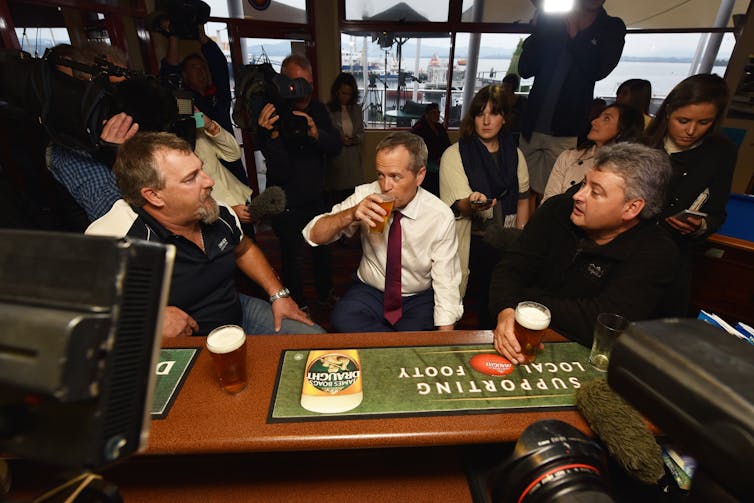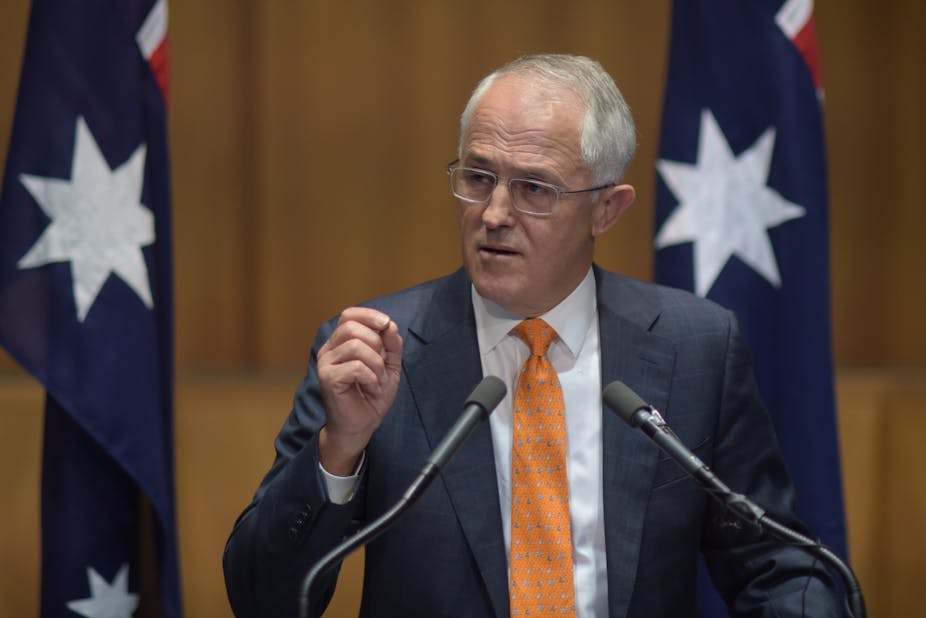As the 2016 election campaign formally begins, new polling shows Scott Morrison’s budget has failed to inspire and the government and Labor are locked in a close race.
The Fairfax Ipsos poll has the Coalition leading marginally – 51-49% on a two party basis, but polling 50-50 when people state their preferences rather than preferences being distributed according to the 2013 election. Newspoll in Monday’s Australian has Labor retaining a 51-49% two-party lead.
It wasn’t expected that people would see the budget as making them personally better off – because mostly it won’t – but it is trailing on “fairness”, a key election issue.
In the Ipsos poll 37% said the budget was fair, while 43% disagreed, a net of minus six. Just under four in ten (39%) were satisfied with the budget, with 46% dissatisfied. This net satisfaction of minus seven is much lower than the 2015 budget’s plus 17. Nearly four in ten say the budget will leave them personally worse off; almost a quarter say they will be better off.
In Newspoll, 39% said they would be worse off from the budget; 34% said it would be good for the economy, 37% were undecided and 29% thought it would be bad for the economy.
Malcolm Turnbull’s approval has taken another knock in the Ipsos poll. His net approval, now plus eight, is down five points since April. Bill Shorten’s net approval, at minus 11, is up 11 points in a month. In Newspoll Turnbull’s net satisfaction rating is minus 11, while Shorten’s is minus 19.
Turnbull retains a strong lead as preferred prime minister in both polls – 51-29% in Ipsos and 49-27% in Newspoll.
The actual start of the campaign had a feel of anti-climax. We’ve known for weeks there will be a double dissolution on July 2, and for days that the announcement would be Sunday.

Nor were the pitches anything other than the expected. Turnbull reprised his favourite lines about exciting times, confidence, optimism and self-belief, spruiked his government’s “plan”, and attacked Labor. Shorten focused on fairness, and appealed to voters to “trust” Labor on a host of fronts, including “to conduct budget repair that is fair”.
Turnbull, who never thinks a touch, or a tonne, of hyperbole hurts, was strong on the rhetoric. Shorten, back in Beaconsfield – where he became a nationally known figure – for the tenth anniversary of the dramatic mine rescue, could extrapolate from the memory of that endeavour to the message “that Australia succeeds when we work together with common endeavour and shared reward”.
Turnbull is “centrist” by inclination and Shorten is from Labor’s right and has had wide connections in the business world (in 2006 he flew to Beaconsfield in a plane provided by Dick Pratt). Nevertheless this is an election full of major differences over policy, with Labor opposing almost all of the government’s phased-in company tax cut and the Coalition accusing the opposition of class warfare. There are gulfs on climate change, education and health spending, and negative gearing.
Each side is trying to reinforce a cardboard cut-out image of the other’s leader: Turnbull, as the extremely wealthy, out-of-touch prime minister who looks after his own; Shorten, as the ex-union figure who wrote in his just-published book: “As Labor leader, I still think like an organiser”.
Labor is helped in its stereotyping of Turnbull by the fact business is the main beneficiary in his government’s first budget. Labor’s resistance to the industrial legislation can be used to paint Shorten as soft on union bad behaviour.
Thanks to Tony Abbott’s strong win in 2013, Turnbull has a good coating of fat. Shorten has to win 19 seats in net terms for majority government; Turnbull can lose up to 13 and still have a majority. The territory between gets to minority government, with shades of 2010.
While opinion poll headlines show national swings, there are variations between states, regions and seats. Tim Colebatch provides a useful rundown of the states; Antony Green lists electorates by state among the wealth of information on the ABC’s site. Much of the fight will be NSW and Queensland, given the number of seats in play; Turnbull is in Brisbane on Monday and Shorten will also be in Queensland.
Turnbull is favourite as the marathon starts. The nature and distribution of the marginals helps him.
The government’s ratings and his popularity have been falling, and he appeals more in some areas than in others. But are people really prepared to throw out a leader, whom they have always liked, after less than eight months? If Shorten became prime minister, that would be five prime ministers since the 2010 election - Gillard, Rudd, Abbott, Turnbull and Shorten. Voters doubt this will happen: in the Ipsos poll 53% think the Coalition will win and only 24% believe Labor will.
Having said that, favourites lose (John Hewson in 1993) and the electorate is fickle – people are cynical, with an “off with their heads” attitude when feeling discontented or let down. Shorten, with a steadily improving performance in recent months, has been on a roll. Turnbull and the government ended budget week with their stupid shenanigans over the ten-year cost of the business tax plan.
An eight-week campaign is a long course, and neither leader has led his team around this heavy track before. How each will stand up to the rigour of what’s ahead is anybody’s guess. If you are placing bets on this election, keep them modest.

